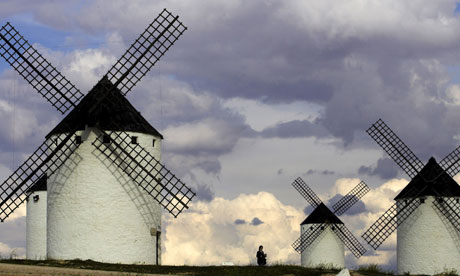
A Spanish newspaper suggests that the country's prime minister,Mariano Rajoy, could be as depressed as the economy. It's possible. He barely speaks in public and panics when confronted with a microphone. I diagnose political shell-shock. He seems to have genuinely believed that all he had to do was to proclaim austerity and cheapen lay-offs, and the markets would just turn around and start buying Spanish sovereign bonds at low rates. Like the markets care. Of course, the opposite happened, and we're in deeper trouble than ever. We sold our soul to the devil and now the devil says it is thinking it over. In our place, I thinkFaustus would sue.
Rajoy had insisted that all of Spain's economic troubles were the fault of his predecessor, the Socialist José Luis Rodríguez Zapatero. So now what? You can't change horses in a storm, but you can change scapegoats, the politician's favourite pet. Another culprit had to be found, and there we have it: Spain's regions and their "reckless over-expending".
Scapegoats are the product of selective breeding, and this one is a winner. It caters to the dreams of Spain's right wing, which always hated the self-governing regions because of their efficiency in competing with Spanish nationalism. And foreigners, most of whom don't understand how the Spanish devolved system works, easily buy this catch-all explanation. This includes the EU's economy commissioner, Olli Rehn, and most of the international media, lured by the examples of regional profligacy they've been provided: an empty jail in Catalonia, and a deserted airport in Castilla-La Mancha.
The phantom airport of La Mancha is indeed a temptation for irony: a billion-euro project languishing under the scorching sun, where Don Quixote fought his mad battle against windmills he had mistaken for evil giants. But hindsight is a wonderful thing. When the airport was planned in the 1990s, low-cost air travel was thought to be a gold mine. Madrid, a city of 6 million, only has one airport. La Mancha is close to both Madrid and Seville, and in the way of the high-speed train AVE. Few questioned its usefulness back then. If it was controversial it was for being a private venture, and not a public one. Then the air transport crisis struck, followed by the financial crisis. In retrospect, we are all very clever. Once they told him, even Don Quixote saw that the giants he had taken on were actually renewables. As for the jail in Figueres, although a NYT reporter quotes in his piece mysterious unnamed "experts" claiming the prison was "not necessary", nobody has disputed its need; the scandal is that it's not being opened in time, not that it was built at all.
When you have 17 regions, you're likely to find examples of whatever you look for, including mismanagement of funds and even corruption. I have criticised them myself in my own region, many times. The question is how representative they are. Not very, I think.
The origins of the regional deficit are the same as the central deficit: not over-expending but the fall in tax revenue due to the economic slowdown. This is aggravated in the case of the regions because it is the central government that collects most of the taxes, and then decides how much it gives back to them. As a whole, the regions are responsible for less than a third of the total Spanish debt, yet they have to do more than a third of the total public expending. And it's not in jails or airports that they spend most of it, but in healthcare, education and other basic services, which in Spain are fully decentralised.
This explains the concentrated attack on regions: imposing cuts on them is the shortest way to downsize the welfare state. Two scapegoats with one stone, so to speak. Most of the regions are under the control of Rajoy's party, which makes it a lot easier to make them take the blame and the pain.
But it's a dangerous game. When it was put in place at the outset of Spain's democracy, the semi-federal system was not just a matter of practicality, but part of a national pact to prevent the country from breaking up. Put pressure and some regions may bend, but others may break away. We could end up with a much more serious crisis than the financial crisis.




Post a Comment